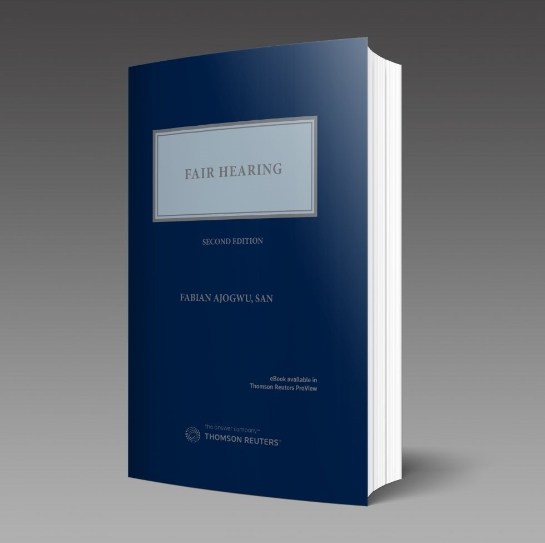The concept of fair hearing is an integral part of the administration of justice and derives from the principles of natural justice and fairness. The principles belie the whole jurisprudence of law and justice. The rule of fair hearing requires that in all disputes between two or more parties, judgment should not be based on a one-sided testimony. It was the Right Hon Lord Templeman, MBE, Lord of Appeal in Ordinary, who once said –
… the Lawyer is a manipulator of words: this is an assertion and not a criticism. Language is the means of disclosing facts, expressing ideas and applying principles.
The ultimate solution in any legal problem is to be found in the application of basic principles to ascertained facts. This application however must be done in such a way and manner that all parties to the dispute are given an equal opportunity to so present their facts, in order that they may be ascertained by a neutral and fair-minded person.
In writing the first edition, it was not my intention to provide a comprehensive survey of all instances of fair hearing in both the judicial and administrative processes. Rather my aim was to provide a practical evaluation of the substantive as well as procedural approach to the concept and principles of fair hearing, which is crucial to the administration of justice in any legal system. There appeared to be a need for a textbook, as opposed to a sourcebook, so as to deal with the substantive law as well as give insights into the attitude of Nigerian courts on the subject, deriving mainly from the 1999 Constitution of the Federal Republic of Nigeria.
In the second edition, I have taken it a step further by looking into fair hearing not just as part of Nigeria’s grundnorm but as a global concept. In furtherance of this, I have added four new chapters and two sub-chapters including: “Origin of Fair Hearing”; “Fair Hearing versus Fair Trial”; Fair Hearing in Nigeria: Considering New Developments in Statutes and Case Law on the Subject”; “Fair Hearing in the Global Context”; “Fair Hearing and Virtual Trials”; Due Process as an Essential Aspect of Fair Hearing” and “Media Trials”.
I have started this book with a discussion on the Origin of fair hearing by looking at historical accounts on the evolution of the concept and how it came to be a widely recognised phenomenon all over the world. Reference was made to the Magna Carta, the Bill of Rights and various Conventions and Charters all applauding the concept. The book retains its discussion on the meaning on fair hearing by looking at the twin principles of natural justice, with emphasis on definitions from case law on the basis of the 1999 Constitution as well as similar provisions in the 1979 Constitution, as well as the ratified African Charter on Human and Peoples’ Rights.
In the second chapter, I have attempted to look at the development of the audi alteram partem rule (let the other side be heard), with emphasis on the scope and limitations. More specifically, I have examined the instances where the rule is excluded, and the specific circumstances that must occur to warrant such. Ex parte situations are discussed. I have also looked at the nemo judex in causa sua rule (not to be a judge in one’s own cause), and the attitude of the courts where this issue is raised. In this edition however, I extended my discussion to fair trials. I attempted to juxtapose the concept of fair hearing with fair trial. While the two concepts may be similar, I tried to draw a fine line between them and established that the fair hearing is a wider concept than fair trial, one so wide, it encompasses fair trial.
New case law and statutes on the subject of fair hearing were considered. One major law that has been introduced in Nigeria since the first edition is the Administration of Criminal Justice Act 2015. It is noteworthy that the Administration of Criminal Justice Law operates in Lagos State, and a few other states are now beginning to adopt the provisions of the law as part of their criminal justice system, for instance, Oyo state.
In the sixth chapter of this book, Fair Hearing as a Global Concept was discussed. I considered specific provisions of some international treaties that touch on the concept including but not limited to the International Covenant on Civil and Political Rights (ICCPR); European Convention on Human Rights (ECHR); American Convention on Human Rights and African Charter on Human and Peoples Rights.
In the seventh and eighth chapter, I examined application of the principles of fair hearing in virtual trials and its role in the advancement of judicial systems, Nigeria and globally. I also considered Due process as an integral aspect of fair hearing and made a distinction between substantive due process and procedural due process- the more popular of the two. The disturbing phenomenon of media trials and the sort of bearing it could have on ensuring fair hearing in the justice system not just at the local level but also internationally was discussed in chapter nine of this edition.
The subject of remedies is so often ignored, yet it is an integral part of the legal process. I have retained the subject in the concluding chapter of the book by providing a practical guide to the remedies available under the Fundamental Rights (Enforcement Procedures) Rules of 2009.
All of these have brought depth and meaning to the second edition of this book on Fair Hearing. This book lays no claim to perfection, and I, therefore, take full responsibility for any errors of omission or commission that may be found herein.
Professor Fabian Ajogwu, OFR, SAN, FCIArb
The Hillview
GRA, Nsukka
June 23, 2020


